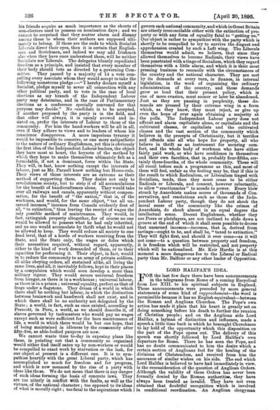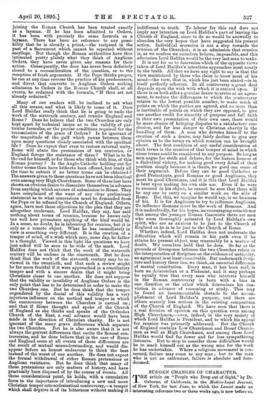LORD HALIFAX'S IDEA. F OR the last few days there have
been announcements in the telegrams from Rome of a coming Encyclical from Leo XIII. to his spiritual subjects in England. These announcements were preceded by more general statements of some kind of rapprochement—the word is permissible because it has no English equivalent—between the Roman and Anglican Churches. The Pope's own action has made it plain that his heart is greatly set on doing something before his death to further the reunion of Christian people; and on the Anglican side Lord Halifax, a layman of distinction and influence, made a speech a little time back in which he besought Churchmen to lay hold of the opportunity which this disposition on the part of the Pope opens out. The delivery of this speech was shortly followed by Lord Halifax's own departure for Rome. There he has seen the Pope, and has no doubt communicated to him the desire which a certain section of Anglicans feel for the healing of the divisions of Christendom, and received from him the assurance of similar wishes on his side. The end which Lord Halifax is believed to have had immediately in view, is the reconsideration of the question of Anglican Orders. Although the validity of these Orders has never been formally denied by the Roman authorities, they have always been treated as invalid. They have not even obtained that doubtful recognition which is involved in conditional reordination. An Anglican clergyman j9ining the Roman Church has been treated exactly as a layman If he has been admitted to Orders, it has been with precisely the same formula as a layman. There has been no reference to any possi- bility that he is already a priest,—the recipient in the past of a Sacrament which cannot be repeated without sacrilege. But though the Roman authorities have thus intimated pretty plainly what they think of Anglican Orders, they have never given any reasons for their action. Consequently, the door has never been definitely closed to a reconsideration of the question, or to the reception of fresh arguments. If the Pope thinks proper, he can at any time reverse the practice of his predecessors, and direct that converts in Anglican Orders seeking admission to Orders in the Roman Church shall, at all events, be ordained with the formula, "If thou art not already ordained."
Many of our readers will be inclined to ask what all this means, and what is likely to come of it. Does Lord Halifax really think that he is going to undo the work of the sixteenth century, and reunite England and Rome ? Does he believe that the two Churches are only kept apart by technical issues as to the validity of par- ticular formulas, or the precise conditions required for the transmission of the grace of Orders ? Is he ignorant of the magnitude of the gulf which yawns between them upon many questions closely associated with the spiritual life ? Does he expect that even to restore external unity, Rome will abate the pretensions of ten centuries, or England forego the resistance of three ? What is to be the end for himself, or for those who think with him, of this Roman journey ? Is the Anglo-Catholic holding out for better terms than have hitherto been offered, but ready all the time to submit if no better terms can be obtained ? The answers given to these questions have not been identical even among very High Churchmen. Some of these last have shown an obvious desire to dissociate themselves in advance from anything which savours of submission to Rome. They have complained of the want of any clear preliminary statement as to what concessions must be demanded from the Pope or be refused by the Church of England. Others, again, have met these objections by the plea that they are altogether irrelevant. Lord Halifax, they say, has said nothing about terms of reunion, because he knows only too well how premature anything of the kind would be. In a sense, no doubt, he is labouring for reunion, but it is only as a remote object. What he has immediately in view is something very different. It is the creation of a temper of mind, of a wish which may, some day, be father to a thought. Viewed in this light the questions we have just asked will be seen to be wide of the mark. Lord Halifax does not think that the work of the sixteenth century will be undone in the nineteenth. But be does think that the work of the sixteenth century may be re- viewed in the twentieth, and that such a review might be far more fruitful if it were approached in a conciliatory temper and with a sincere desire that it might bring Christians closer to one another. He does not suppose that the validity or invalidity of Anglican Orders is the only point that has to be determined in order to make the two Churches one. But he does think that the temper engendered by the denial of this validity has a very injurious influence on the method and temper in which the controversy between the Churches is carried on ; and that if Rome thought and spoke of the Church of England as she thinks and speaks of the Orthodox Church of the East, a real advance would have been made in the direction of Christian charity. He is not ignorant of the many grave differences which separate the two Churches. But he is also aware that it is not always the gravest differences that excite the fiercest con- troversies, and he does believe that in the case of Rome and England some at all events of these differences are the result of mutual misunderstanding, and would dis- appear before an honest endeavour to think the best instead of the worst of one another. He does not expect the formal withdrawal of either Roman pretensions or Anglican resistance. But he does think that many of these pretensions are only matters of history, and have practically been disposed of by the course of events. All these considerations point, he holds, with a cumulative force to the importance of introducing a new and more Christian temper into ecclesiastical controversy,—a temper which shall deprive it of its bitterness without making it indifferent to truth. To labour for this end does not imply any intention on Lord Halifax's part of leaving the Church of England, since to do so would be avowedly to abandon the very hopes that have suggested his present action. Individual secession is not a step towards the reunion of the Churches ; it is an admission that reunion is, as we confess we ourselves believe, impossible, and this admission Lord Halifax would be the very last man to make.
It is not for us to determine which of the opposite views taken of Lord Halifax's intentions approaches most nearly to the truth. All that we have any right to say is that the view maintained by those who claim to know most of his mind—the view, that is, which has just been stated—is in itself perfectly coherent. In all controversy a great deal depends upon the wish with which it is entered upon. If there is on both sides a genuine desire to arrive at an agree- ment, to reduce the differences to which the controversy relates to the lowest possible number, to make much of points on which the parties are agreed, and no more than is inevitable of points on which they are opposed, to give one another credit for sincerity of purpose and full faith in their own presentation of their own case, there would be more chance of bringing disputes to a satisfactory con- clusion, and far less danger to Christian charity in the handling of them. A man who devotes himself to the creation of such a desire, may fairly decline to give any opinion as to the terms on which reunion can be brought about. The first condition of any useful consideration of such terms is the creation of that temper of mind in which alone terms could be considered to any purpose. So long as men argue for strife and debate, for the barren honour of a dialectical victory, for making good every detail of their position simply because it is theirs, no good can come of their argument. Before they can be good Catholics or good Protestants, good Romans or good Anglicans, they must be good Christians, and it is this that Lord Halifax is bent upon making his own side see. Even if he were to succeed in his object, he cannot be sure that there will be any one to carry on a similar work on the side of Rome. But this, we imagine he would say, is no business of his. It is for Anglicans to try to influence Anglicans. To influence Romans must be the work of Romans. And it is undoubtedly, for his hopes, an encouraging coincidence that among the younger Roman Canonists there are men who seem thoroughly animated by Lord Halifax's own spirit, who are as anxious to be just to the Church of England as be is to be just to the Church of Rome. Whether, indeed, Lord Halifax does not underrate the difficulties which will remain in his path even if he attains his present object, may reasonably be a matter of doubt. We ourselves hold that he does. So far as the grounds of divergence between the two Churches relate to the interpretation of Scripture on the evidence of antiquity, an agreement is at least conceivable. But underneath Scrip- ture and history there lies, we think, an essential difference of mental constitution. Every man, it has been said, is born an Aristotelian or a Platonist, and it may perhaps be equally true that every man who interests himself in the Roman controversy is born with a bias in one direction or the other which determines his con- viction in advance of reasoning or study. This may be found an insurmountable obstacle to the accom- plishment of Lord Halifax's purpose, and there are others scarcely less serious in the existing composition of the Church of England. We have seen that there is a real division of opinion on this question even among High Churchmen,—even, indeed, in the very society of which Lord Halifax is President, and to which his appeal for reunion was primarily addressed. But the Church of England contains Low Churchmen and Broad Church- men as well as High Churchmen, and among these Lord Halifax would find far fewer and far less sympathising listeners. But to stop to consider these difficulties would be to mark himself out as the wrong man for the work he has undertaken. Where a religious movement is con- cerned, failure may come to any man ; but to the man who is not an enthusiast, failure is absolute and fore- doomed.



































 Previous page
Previous page